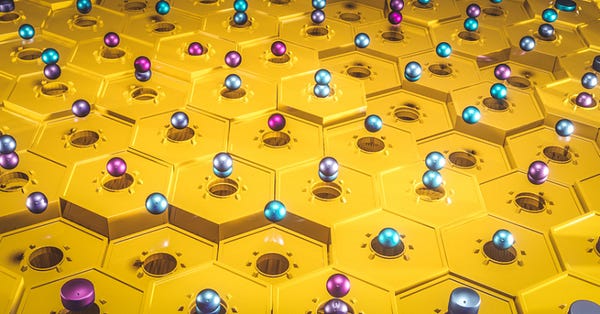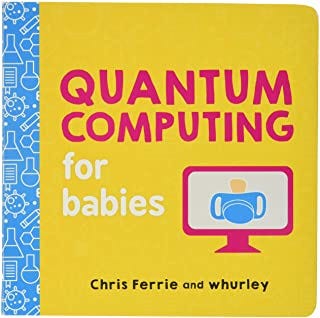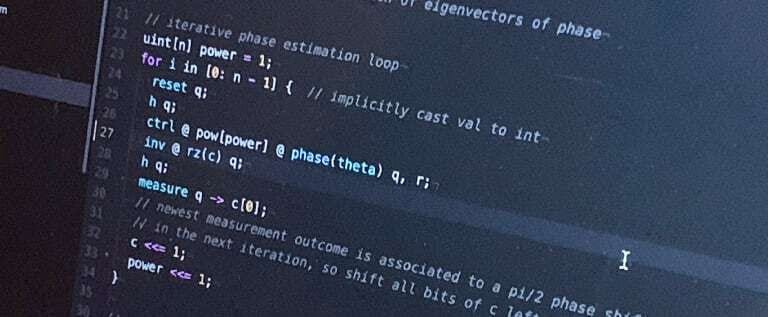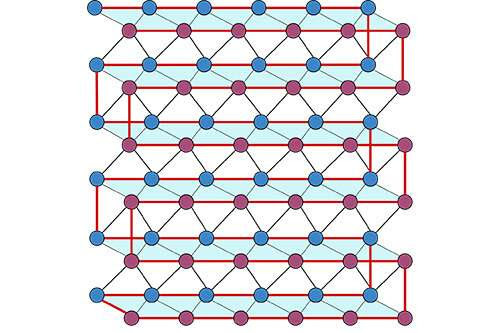The Week in Quantum Computing - December 14th
The Week in Quantum Computing. Brought to you by Sergio Gago and The Quantum World Association.
Do you like this Newsletter? Like, share and subscribe! :) (or do the three things in superposition :) ). You can also follow the news in real time by following me on Twitter: @piratecto
Quick Recap
What do we have today? An explanation on how the Gaussian Boson Sampling by Pennylane. This is the technique the Chinese group used last week to claim quantum advantage. IBM releases the next version of OpenQASM paving the ground for the next generation of “quantum assembler”.
One of the reasons we have had so many announcements, specially on the research and roadmap side (See ionQ promising roadmap below) is because QCWare’s Q2B2020 conference was held, putting together some of the most prominent figures in the community. As we advance, there are more divergences on how we see the future (big fridges vs trapped ions for example). Both from the business and research side.
Jiuzhang’s quantum advantage announcement was followed this week by a Danish release of a quantum optic chip that in principle, does the same thing, pushing the photons way forward.
Featured Content
What is hype and what is reality in this week’s roadmap announcements? This twitter thread summarizes it perfectly:


The Book of the Week
Too much Algebra? Try this one, by Chris Ferrie (for Babies series) and Whurley (Strangeworks)
The Summary of the Week
Quantum advantage with Gaussian Boson Sampling — PennyLane
Let’s first explain the name. Boson refers to bosonic matter, which, along with fermions, makes up one of the two elementary classes of particles. The most prevalent bosonic system in our everyday lives is light, which is made of particles called photons.
Link: https://ift.tt/3mSLQzU
December 07, 2020 at 11:33AM
Taiwan aims high with quantum technology investment
TAIPEI (Taiwan News) — Taiwan will invest NT$8 billion (US$282 million) in the development of quantum technology in the coming five years with a view to becoming a tech hub that boasts more than semiconductor manufacturing prowess.
Link: https://ift.tt/2JU6FMR
December 07, 2020 at 08:33PM
Researchers can use qsim to explore quantum algorithms
A year ago, Google’s Quantum AI team achieved a beyond-classical computation by using a quantum computer to outperform the world’s fastest classical computer. With this, we entered a new era of quantum computing.
Link: https://ift.tt/36T4Rgd
December 07, 2020 at 09:33PM
What Quantum Computing Could Mean for Manufacturing
Quantum computing could potentially transform the supply chain landscape to optimise vendor orders and improve accompanying logistics using dynamic real-time decision-making.
Link: https://ift.tt/3op2NCq
December 08, 2020 at 10:33AM
Many scientists believe that quantum will enjoy its first real commercial success in sensing
Quantum sensors utilize quantum states for measurements. They capitalize on the fact that quantum states are susceptible to disturbances meaning they also can become vulnerable to measuring instruments.
Measurement devices that exploit quantum properties have been around for a while, such as atomic clocks, laser distance meters, and magnetic resonance imaging used for medical diagnosis. What can now be considered new is that individual quantum systems, like atoms and photons, are increasingly used as measurement probes. The entanglement and manipulation of quantum states are used to improve the sensitivity, even beyond the limit set by a conventional formulation of the quantum mechanical uncertainty principle.
Link: https://ift.tt/3mZ73bL
December 08, 2020 at 10:33AM
A New OpenQASM for a New Era of Dynamic Circuits
As system designers and developers, we make tools suited to the needs of the moment. Over time, our needs change and our tools must evolve with them. We have reached such a moment for the language used to describe circuits in Qiskit: OpenQASM. It is time for an upgrade.
Link: https://ift.tt/2JP52Ah
December 08, 2020 at 04:33PM
Generation of High Resolution Handwritten Digits with an Ion-Trap Quantum Computer
Generating high-quality data (e.g., images or video) is one of the most exciting and challenging frontiers in unsupervised machine learning. Utilizing quantum computers in such tasks to potentially enhance conventional machine learning algorithms has emerged as a promising application, but poses big challenges due to the limited number of qubits and the level of gate noise in available devices. Here, we provide the first practical and experimental implementation of a quantum-classical generative algorithm capable of generating high-resolution images of handwritten digits with state-of-the-art gate-based quantum computers. In our quantum-enhanced machine learning model, we implement a quantum-circuit based generative model to sample the prior distribution of a Generative Adversarial Network (GAN). We introduce a multi-basis technique which leverages the unique possibility of measuring quantum states in different bases, hence enhancing the expressibility of the prior distribution to be learned. We demonstrate a full training of this hybrid algorithm on an ion-trap device based on $^{171}$Yb$^{+}$ ion qubits to generate high-quality images and quantitatively outperform comparable classical GANs trained on the popular MNIST data set for handwritten digits.
Link: https://ift.tt/2K47d2C
December 08, 2020 at 05:33PM
PennyLane on Braket + Progress Toward Fault-Tolerant Quantum Computing + Tensor Network Simulator
August 2020 – General Availability of Amazon Braket with access to quantum computing hardware from D-Wave, IonQ, and Rigetti. September 2020 – Access to D-Wave’s Advantage Quantum Processing Unit (QPU), which includes more than 5,000 qubits and 15-way connectivity.
Link: https://ift.tt/3oAD2PL
December 09, 2020 at 08:33AM
Intel Debuts 2nd-Gen Horse Ridge Cryogenic Quantum Control Chip
What’s New: At an Intel Labs virtual event today, Intel unveiled Horse Ridge II, its second-generation cryogenic control chip, marking another milestone in the company’s progress toward overcoming scalability, one of quantum computing’s biggest hurdles.
Link: https://ift.tt/2L76kaf
December 09, 2020 at 04:33PM
IonQ’s roadmap: Quantum machine learning by 2023, broad quantum advantage by 2025
IonQ today laid out its five-year roadmap for trapped ion quantum computers. The company plans to deploy rack-mounted modular quantum computers small enough to be networked together in a datacenter by 2023. And it expects to achieve broad quantum advantage by 2025.
Link: https://ift.tt/3gsqvuI
December 10, 2020 at 08:33AM
When will quantum computers finally deliver commercial value?
To predict when quantum computing will deliver commercial value is possibly the largest “make or break” question in quantum computing today.
Link: https://ift.tt/2W2bUgs
December 10, 2020 at 06:33PM
Hidden symmetry could be key to more robust quantum systems, researchers find
Researchers have found a way to protect highly fragile quantum systems from noise, which could aid in the design and development of new quantum devices, such as ultra-powerful quantum computers.
Link: https://ift.tt/376yR8c
December 10, 2020 at 06:33PM
QC Ware and IonQ Experiment Demonstrates Machine Learning Algorithms Can Run on Near-Term Quantum Hardware
QC Ware and IonQ teams ran QC Ware’s machine learning algorithm for classification on IonQ’s 11 qubit system. We overcame what was an insurmountable hurdle in QML — loading classical data onto quantum states in a noise-resilient way to allow efficient and robust QML applications. Central to the success of our experiment are QC Ware’s own Forge Data Loader™ technology, which optimally transforms classical data onto quantum states, and the high-quality, fully connected qubits of IonQ’s 11 qubit system.
Link: https://ift.tt/375zPSh
December 11, 2020 at 03:33PM
Researchers publish significant step toward quantum advantage
The team, led by Bristol researcher and Phasecraft co-founder, Dr. Ashley Montanaro, has discovered algorithms and analysis which significantly lessen the quantum hardware capability needed to solve problems which go beyond the realm of classical computing, even supercomputers.
Link: https://ift.tt/39XUoBX
December 11, 2020 at 06:33PM
After Jiuzhang, Chinese scientists expect to build universal quantum computers in '15 to 20 years'
Chinese scientists said they expect to build universal quantum computers within 15 to 20 years after establishing Jiuzhang, a new light-based quantum computer prototype via which a maximum of 76 photons were detected.
Link: https://ift.tt/3nbdQiu
December 11, 2020 at 06:33PM
Simulating subatomic physics on a quantum computer
When two heavy ions collide inside a particle accelerator, they produce a near-perfect fluid through which an assortment of fundamental particles swim.
Link: https://ift.tt/3oKm9SR
December 12, 2020 at 09:33AM
How Goldman Sachs and JPMorgan are using quantum computing
As we've reported before, banks have been busy building teams of quantum computing researchers. Today, the heads of those teams at Goldman Sachs and JPMorgan presented their work at the Q2B Practical Quantum Computing conference.
Link: https://ift.tt/3ab7k7w
December 12, 2020 at 09:33AM
China strikes back: bans exports of quantum computing hardware and software
In the latest skirmish of the deepening trade war of the US, the UK, parts of Europe, Australia and New Zealand versus China, late last week the Chinese government passed a new control law that prohibits the exportation from the PRC of encryption technology and cryptanalysis machines.
Link: https://ift.tt/2KdMcTn
December 12, 2020 at 07:33PM
(US) Congress just voted to spend $10 billion on AI, quantum computing
Much of the tech industry's focus on the National Defense Authorization Act has revolved around President Trump's threat to veto the must-pass defense spending bill because it does not repeal Section 230.
Link: https://ift.tt/37ae57X
December 12, 2020 at 10:33PM











